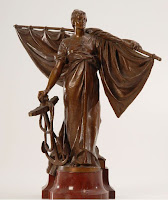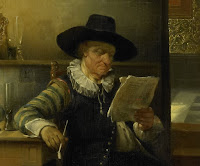 |
| ship lantern 2nd half of 17th century |
The FODDIK (lamp with perpetual flame) is one of the defining symbols of Fryas culture in Oera Linda (plural: FODDIKA or FODDIKUM). This word only appeared in two of the oldest Old Frisian dictionaries, seemingly only based on oral tradition, recorded in manuscript "Memoriale linguae Frisicae" by the East-Frisian (German) pastor Johannes Cadovius Müller (1650-1725). This work was published in print, 1875 and 1911. Words in it were sorted by category, not alphabetically, and it included drawings of farms, clothes and weapons.
No entries in these Old Frisian dictionaries: Richthofen (1840), Hettema (1874), Dijkstra e.a. (1896); online: Köbler (2014), Integrated Language Bank (gtb.ivdnt.org), DWDS ("German vocabulary from 1600 to today"). The Old Frisian dictionaries after DHH (1832) seem to be based on the known law books only.
The word does not seem to have modern cognates, but may be related to the Old Greek word for 'light' which is the origin of our 'photo': φάος/ φαῦος/ φόως/ φῶς (pháos/ phaûos/ phóōs/ phôs). Also, the Dutch word for 'spark' is 'vonk'. Perhaps, the Dutch 'vod' (rag) once referred to 'wick'/ 'fuse', since its synonym 'lomp' (rag) was the origin of the common word for 'wick'/ 'fuse': 'lont'. Lamps in antiquity probably burned on oil.
Entries in dictionaries (found thus far, translated into English and paraphrased):
| manuscript J.C. Müller (c.1700 and print editions 1875, 1911) |
foddick — lamp (in category 'of the house') |
| dictionary Wiarda (1786) p.140 |
foddick — a lamp (ref. JCM), from 'fire', gothic: 'fon, fun', Islandic: 'voncke' (a spark), Dutch 'fannung' (a lantern), Anglosaxon [comment JO: he used JCM's entry and added his own questionable explanation] |
| dictionary Hettema (1832) p.27 |
foddik — (feminine [?]) lamp (ref. Wiarda) |
I have chosen to translate the word as 'lamp' (a general term), although it may sometimes have been used to refer more specifically to, for example, a lantern, beacon* or torch. (*BÁKEN for 'beacon' is used once, as a metaphor.)
Fragments in Codex Oera Linda
2a - Festa, Take up your Stylus
[006/05] NW SKOLDE FÀSTA THJU NÉJA FODDIK VPSTÉKA. ÀND THÁ THAT DÉN WAS AN ÀJNWARDA FON THÀT FOLK (...)
Now it was time for Festa to light the new lamp, and when that was done in the presence of the folk (...)
2f - Frya’s Tex
[014/01] THAN SKIL THJU FODDIK NÀMER UTGA THÉR IK FÁR JO VPSTOKEN HÀV.
Then the lamp that I have lit for you will never go out.
3a - Burg Laws
[015/01] SAHWERSA THÉR ÁRNE ÉNE BURCH BVWET IS. SA MOT THJU FODDIK THÉRA AN THA FORMA FODDIK ET [5] TEX.LÁND VPSTÉKEN WRDA. THÁCH THÀT NE MÉI NÀMMER OWERS AS THRVCH THA MODER SKÉN.
When a burg is built somewhere, its lamp must be kindled from the original flame in Texland, and that can only be done by the folk mother.
[015/15] THJU MODER TO TEX.LAND MÉI ÉN ÀND TVINTICH FÁMNA ÀND SJVGUN SPILLE MAN’GÉRTA HÀVA. TILTHJU THÉR ÀMMER SJVGUN BY THÉRE FODDIK MUGE WÁKJA DÉILIKES ÀND THES NACHTES.
The folk mother of Texland may have twenty-one maidens and seven spindle girls, so that there may always be seven to attend the lamp day and night.
9a - The War of Kelta and Minerva
[065/10] MINERVA ÀND HJRA FÁMNA ÀND THA FODDIK WRDON ALLE THRVCH THA RÀPPA STJURAR HRETH.
Minerva, her maidens, and the lamp were all saved by swift steersmen.
9b - Jon’s Revenge
[066/01] MEN THRVCH SIN SKELTA.BI.NACHT AND SVME SINRA LJUDUM WÀRTH THJU FODDIK ÀND THA FÁMNA HRET.
But his deputy-by-night and some of his men rescued the lamp and the maidens.
[066/25] THÀT STRÍDANDE LAND.FOLK WÀRTH AL FAT. MEN JON BURCH HIN [25] SELVA MITH SIN LJUD VPPA SINA FLÁTE. MITH NEMAND BÉDA THA FODDIKA. BIJONKA MIN.ERVA ÀND THA FÁMNA FON BÉDAR BURGUM.
The fighting landsmen were all captured, but Jon saved himself and his men upon his fleet, taking both lamps with them, as well as Minerva and the maidens of both burgs.
9c - Kelta and the Gools
[068/05] ÉNIS DÉLIS. THAT HJU NÉN MAR BURGA NÉDE. TWÍAS THAT HJU THÉR NÉN BURCH.FÁMNA [10] NÉDE ÀND THRÍAS THRVCHDAM HJU NÉN EFTE FODDIK NAVT NÉDE.
firstly, because the Kelts did not have more burgs, secondly, because they had no burg maidens there, and thirdly, because they had no proper lamp.
9d - Jon and Minerva Resettle
[069/25] JON NAM THÉRE FODDIK FON KÀLTA ÀND HJRA FÁMNA MITHA. ÀND MIN.ERVA HILD HJRA AJN FODDIK ÀND HJRA AJN FÁMNA.
Jon took Kelta's lamp and maidens with him, and Minerva kept her own lamp and maidens.
10a - Ulysus’ Quest for a Lamp
[075/15] THIS KÉNING WAS THRVCH ÉNE PRESTERESSE FAR.SÉID THAT ER KÉNING [20] WERTHA SKOLDE OVIR ALLA KRÉKA.LÁNDA SA.R RÉD WISTE VMBE.N FODDIK TO KRÉJANDE THÉR VPSTÉKEN WAS ANDA FODDIK IT TEX.LÁND.
This king was foretold by a priestess to become king over all of the Greeklands if he managed to get a lamp that was lighted at the one of Texland.
[076/05] NÉI THÉRA FÁMNA HROP HETHER TO LESTA EN FODDIK FON HIR KRÉJEN. THA HJU HET.IM NAVT NE BÁT.
According to the maidens, he eventually received a lamp from her, although it did not benefit him,
11b - Death of Frana
[082/01] TWA JÉR NÉIDAM KÉM THENE MÁGÍ SELVA MITH EN FLÁTE FON LICHTE KÁNUM THA MODER FON TEX.LAND ÀND THA FODDIK TO RÁWANA.
Two years later, the magus came with a fleet of light boats, to kidnap the Mother from Texland (Frana), and steal the lamp.
[083/01] AS HJU NW WITHER ALSA FÉRE HÉL ÀND BÉTER WÉR THAT HJU FÀST SPRÉKA MACHTE SÉIDE THENE MÁGÍ THAT HJU MITH FARA MOSTE. THA THAT HJU HJRA FODDIK [5] AND FÁMNA HALDA SKOLDE.
When she was well enough to speak again, the magus told her he was taking her with him but she could keep her maidens and the lamp.
11c - Death of the Magus
[085/10] NÉI THAT THA MODER VRDÉN WAS. LÉTER THA FODDIK ÀND THA FÁMNA [15] TO SINA SKIP TOBRENGA BIJUNKA ALLE INBOLD THÉR IM LIKTE.
After the mother was killed, he had the lamp and the maidens brought to his ship, as well as all the spoils of his liking.
[086/20] MEN THA FODDIK WAS UTGVNGON [25] ÀND NIMMAN WISTE HO.T KÉMEN WAS.
But the lamp had faded away and no one knew how that had happened.
13h - Apollania’s Burg
[107/01] INNA TORE HANGT THJU FODDIK. [5] THA WAGAR THÉRE TORE SEND MITH KESTLIKA STÉNA SMUKAD.
In the tower, the lamp hangs. Its walls are decorated with precious stones.
[108/05] BY VS VPPER BURCH IS.T ALSA DÉLAD. SJVGUN JONGE FÁMNA WÁKATH BI THÉRE FODDIK. AIDER WÁK THRJA STUNDA.
Tasks at our burg are divided so that seven young maidens attend the lamp in three-hour shifts.
15c - Yesus or Buda of Kashmir
[140/25] THAM SKILUM HJARA FODDIKUM ÀND THÀT LJUCHT BUTA BRINGA SÁ THAT [30] ALLERA MÀNNALIK WÉRHÉD MÉI SJAN. HJA SKILUN WÉ HROPA OVERA DÉDA THÉRA PRESTERA ÀND FORSTA.
They will bring their lamps and the light into the open, so that everyone may see truth. They will condemn the deeds of the priests and princes.









